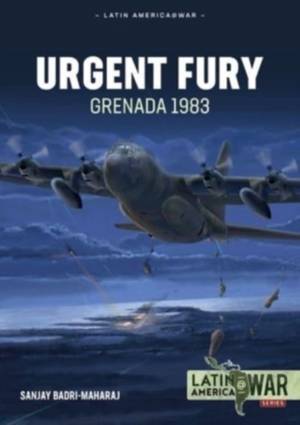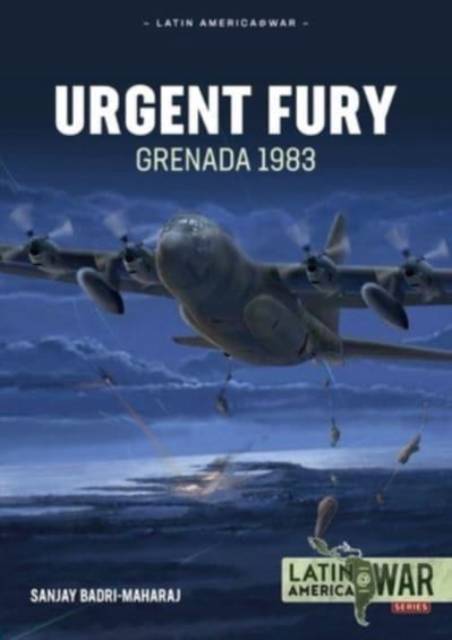
- Retrait gratuit dans votre magasin Club
- 7.000.000 titres dans notre catalogue
- Payer en toute sécurité
- Toujours un magasin près de chez vous
- Retrait gratuit dans votre magasin Club
- 7.000.0000 titres dans notre catalogue
- Payer en toute sécurité
- Toujours un magasin près de chez vous
27,95 €
+ 55 points
Description
"This well illustrated monograph pretty much captures the essentials for understanding the events of October 1983 in Granada."--The Journal of the Air Force Historical Foundation
In 1983, the United States launched a military operation to remove the military junta that had taken over the Caribbean island of Grenada. This operation, code-named Urgent Fury, was held out by the Regan Administration as a major military success and a victory against communism. In some ways it was. In others it was a foregone conclusion, a victory against a discredited regime with little support internally or externally.
Urgent Fury: Grenada 1983 examines the genesis of the Grenadian Revolution of 1979, the eventual fall of the Gairy Regime, and establishing of the English-speaking Caribbean's only Soviet-bloc client state, albeit a short-lived one, and the rise and fall from grace of the populist Maurice Bishop. The growth and development of the People's Revolutionary Armed Forces of Grenada are discussed and their strength, weapons and training are examined along with detail of Cuba's military and civilian and presence and Castro's agenda to influence the Grenadian Revolution.
The fall of Bishop's government, and his subsequent arrest and murder, along with the popular backlash that this sparked are discussed, and the call for intervention is analyzed with attention being paid to the role of the Eastern Caribbean States and their contribution towards legitimizing the US action.
The planning, preparation and execution of Urgent Fury are detailed with attention being paid to the role of the Regional Security System and the Barbados Defence Force in this process. Operation Urgent Fury itself is covered in detail, with an emphasis upon the resistance of Grenadian Forces, despite many not reporting for duty.
Urgent Fury: Grenada 1983 is illustrated throughout with photographs, many reproduced in full color, along with original color artworks detailing the vehicles, aircraft and troops employed by both sides.
In 1983, the United States launched a military operation to remove the military junta that had taken over the Caribbean island of Grenada. This operation, code-named Urgent Fury, was held out by the Regan Administration as a major military success and a victory against communism. In some ways it was. In others it was a foregone conclusion, a victory against a discredited regime with little support internally or externally.
Urgent Fury: Grenada 1983 examines the genesis of the Grenadian Revolution of 1979, the eventual fall of the Gairy Regime, and establishing of the English-speaking Caribbean's only Soviet-bloc client state, albeit a short-lived one, and the rise and fall from grace of the populist Maurice Bishop. The growth and development of the People's Revolutionary Armed Forces of Grenada are discussed and their strength, weapons and training are examined along with detail of Cuba's military and civilian and presence and Castro's agenda to influence the Grenadian Revolution.
The fall of Bishop's government, and his subsequent arrest and murder, along with the popular backlash that this sparked are discussed, and the call for intervention is analyzed with attention being paid to the role of the Eastern Caribbean States and their contribution towards legitimizing the US action.
The planning, preparation and execution of Urgent Fury are detailed with attention being paid to the role of the Regional Security System and the Barbados Defence Force in this process. Operation Urgent Fury itself is covered in detail, with an emphasis upon the resistance of Grenadian Forces, despite many not reporting for duty.
Urgent Fury: Grenada 1983 is illustrated throughout with photographs, many reproduced in full color, along with original color artworks detailing the vehicles, aircraft and troops employed by both sides.
Spécifications
Parties prenantes
- Auteur(s) :
- Editeur:
Contenu
- Nombre de pages :
- 90
- Langue:
- Anglais
- Collection :
Caractéristiques
- EAN:
- 9781915070739
- Date de parution :
- 15-09-22
- Format:
- Livre broché
- Format numérique:
- Trade paperback (VS)
- Dimensions :
- 204 mm x 292 mm
- Poids :
- 362 g

Les avis
Nous publions uniquement les avis qui respectent les conditions requises. Consultez nos conditions pour les avis.






